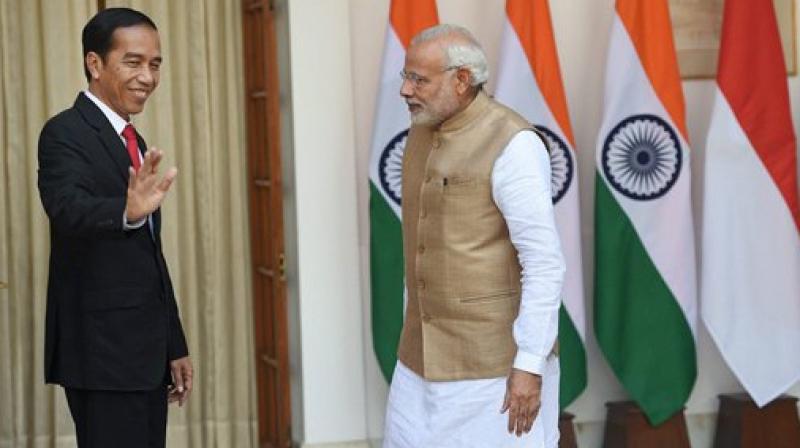India, Indonesia resolve to deepen coop to combat terror
The countries also decided to boost bilateral trade and investment, particularly in oil and gas, pharmaceuticals, IT and skill development.

New Delhi: India and Indonesia, the world's most populous Muslim nation, on Monday agreed to strengthen defense and security ties with a major focus on maritime space and deepen cooperation for effectively combating terror, its financing, money laundering and arms smuggling.
In talks between Prime Minister Narendra Modi and Indonesian President Joko Widodo, the two countries with impressive growth rates also decided to boost bilateral trade and investment, particularly in areas like oil and gas, pharmaceuticals, IT and skill development.
A joint statement issued after the talks said the two leaders condemned terrorism in all its forms and manifestations in the strongest terms, emphasizing "zero tolerance" for acts of terror.
Referring to the South China Sea disputes, where Indonesia is also a party, the two leaders called for resolving the issue through peaceful means and in accordance with universally recognized principles of international law including the UNCLOS (UN Convention on the Law of the Sea).
Emphasizing on the need to improve connectivity and encourage people-to-people contact, the two leaders also welcome Garuda, Indonesia's decision to commence direct flights from Jakarta to Mumbai.
On combating terrorism, the joint statement said Modi and Widodo called upon all countries to implement the UNSC Resolution 1267 and other relevant resolutions designating terrorist entities, in an apparent reference to China blocking India's move to get Jaish-e-Mohammed chief Masood Azhar designated as a global terrorist by the UN.
The two leaders also asked all countries to work towards eliminating terrorist safe havens and infrastructure, disrupting terrorist networks and their financing channels, besides stopping cross-border terrorism, seen as a message to Pakistan.
Modi and Widodo also underlined the need for all nations to deal with trans-national terrorism emanating from their territory by effective criminal justice response while agreeing to extend bilateral cooperation to combating terror, organized crime, drugs and human trafficking, money laundering and arms smuggling.
In his media statement, Modi said the talks focused on the full range of bilateral cooperation and both sides agreed to prioritize defense and security cooperation, besides enhancing efforts to ensure safety and security of the sea lanes.
"As the world's most populous Muslim nation, Indonesia stands for democracy, diversity, pluralism, and social harmony. These are also our values. Our nations and societies have nurtured strong bonds of commerce and culture throughout our history," he said.
The Prime Minister said both sides agreed that early implementation of Indo-ASEAN Free Trade Agreement in Services and Investment, and finalization of the Regional Comprehensive Economic Partnership would be important steps to further boost trade ties.
"To sustain the momentum of our partnership, President Widodo and I have directed for an early meeting of the existing ministerial-level mechanisms to carry forward the bilateral cooperation agenda," he said.
The Indonesian President, on his first visit to New Delhi, said there were detailed talks on ways to strengthen economic partnership, adding Indonesia wants to diversify exports to India.
Indonesia has emerged to become the second largest trading partner of India in the ASEAN region. Bilateral trade has increased from $6.9 billion in 2007-08 to $19.03 billion in 2014-15.
In 2015-16, the trade volume fell to $9 billion due to global economic situation, fall in commodity prices and less overall imports by Indonesia.
"It is the largest economy in South East Asia. And, India is one of the fastest growing large economies in the world. As two large democracies and major emerging economies, we have shared economic and strategic interests," Modi said.
He said the two countries also decided to ramp up investment in infrastructure and leverage each other's capabilities. In this regard, he said the CEOs' Forum should take the lead in identifying new avenues of wider and deeper industry-to-industry engagement.
A separate Joint Statement on Maritime Cooperation, outlining the agenda of bilateral engagement in the area was also issued.
Regarding defense and security ties, the two leaders gave a directive for early convening of the Defense Ministers' Dialogue and the Joint Defense Cooperation Committee (JDCC) meetings to review and upgrade the existing 'Agreement on Cooperative Activities in the Fields of Defense' to a substantive bilateral Defense Cooperation Agreement.
On fighting terror, the two leaders called for enhanced cooperation including through greater exchange of information and intelligence between the two sides.
They resolved to significantly enhance bilateral cooperation in combating terror, its financing, money laundering, arms smuggling, trafficking in human beings and cyber crime.
With regard to maritime issues, Modi and Widodo reiterated their commitment to respecting freedom of navigation and over flight, and unimpeded lawful commerce, based on the principles of international law, as reflected notably in the UNCLOS.
"In this context, they urged all parties to resolve disputes through peaceful means without resorting to threat or use of force and exercise self-restraint in the conduct of activities, and avoid unilateral actions that raise tensions," the joint statement said.
It said the two leaders underscored the importance of pluralism, democracy, and rule of law as key values to achieve peaceful co-existence.
"They welcomed the convergence in the political, economic and strategic interests of the two countries that provides an enduring basis for a long-term strategic partnership," it said.
The Indonesian President and Modi agreed to hold annual Summit meetings, including on the margins of multilateral events.
"As strategic partners and maritime neighbours, the two leaders emphasized the importance of further consolidating the security and defense cooperation between the two countries," the statement said.

